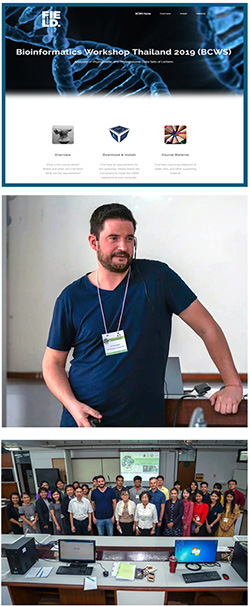Teaching
Current and past classes
Grainger Bioinformatics Workshop Series: Spain & India
JECRC University and University of Rajasthan, Jaipur, India (Instructor, January 2025) Complutense University, Madrid, Spain (Instructor, June 2022)

The Grainger Bioinformatics Workshop is a recurring international course designed to bring practical bioinformatics into the classroom—especially for students and early-career researchers in resource-limited settings. The workshop introduces participants to genome-scale data analysis, phylogenetics, and the Linux command line through hands-on, accessible exercises that require no prior programming experience.
In 2022, we trained 31 students from six Spanish universities in Madrid. In 2025, the workshop was hosted in Jaipur, India, where we taught 25 research staff and students from JECRC University and the University of Rajasthan. We are grateful to both host institutions for their invitations and support.
To empower participants beyond the classroom, I developed a portable software suite and an open-access online platform with step-by-step tutorials, datasets, and all required tools. The workshop emphasizes that bioinformatics is not limited by infrastructure. With creativity and curiosity, students can reuse publicly available data (such as those from NCBI) to conduct their own research directly from personal laptops. Materials remain freely available here.
Bioinformatics Workshop Thailand 2019 (BCWS)
Ramkhamhaeng University, Bangkok, Thailand
(Instructor, February–March 2019)

This was the first edition of what would become the recurring Grainger Bioinformatics Workshop series. Held in collaboration with Dr. Thorsten Lumbsch, the workshop introduced 28 students from Ramkhamhaeng University to the core principles of phylogenetics and bioinformatics. Over one week, participants learned to navigate the Linux command line, handle genomic data, build alignments, and reconstruct phylogenetic trees. The workshop used real-world sequencing data and emphasized practical skills, such as genome assembly and gene region identification.
The course provided an open-access website containing all instructional materials, exercises, and software needed to complete the workshop independently. It marked the beginning of our mission to bring bioinformatics training to students around the world, regardless of local infrastructure or resources.
We are grateful to Kawinnat Buaruang and the Lichen Research Unit and Lichen Herbarium (RAMK) at Ramkhamhaeng University for their hospitality and support.
Computational Biology at the Field Museum – CBFM
The Field Museum of Natural History (Instructor, 2014 - 2017)
CBFM is a course based on the use of the Linux command line for computational biology applications. This course offers the novice both user tools and guidance to enter the world of Linux and computational biology. The course website offers constant access for students to the course material and represents a great resource for interested autodidacts.
University of Nebraska-Lincoln
(Instructor, Summer 2012)

Improving Presentation Skills
The aim of this course was to sharpen the students' presentation skills, to encourage their involvement in scientific discussions, and to have fun with scientific communication. This course offered introductions in how to plan and organize a scientific presentation, how to prepare a PowerPoint presentation with well-designed, notable content, and information to consider when presenting work. The students then used their acquired knowledge to give short talks based on scientific publications. In subsequent discussions of their presentations, we gave feedback and focused on how the presenters could improve their performance.
Plant Molecular Evolution and Phylogenetics - PMEP
University of Bonn (Teaching Assistant, 2003 - 2011)
PMEP is an introductory class taught to develop an evolutionary-based understanding of modern phylogenetics, taxonomy, and cladistics. Students used hands-on experiences to learn the basics of molecular biology and the methods of phylogenetic analyses in this 4-week all-day course. In this course, we used real-world examples from actual molecular biology research. These experiences offered students great insight into the work of a scientist—from the success to the disappointments that go along with research. I co-designed several student projects and taught this class together with my PhD advisor Dr. Volker Knoop. You can find more information about this class and the M.Sc. in Plant Sciences at the University of Bonn under the following links:
Please see my CV for a detailed list of all courses and guest lectures that I have taught.